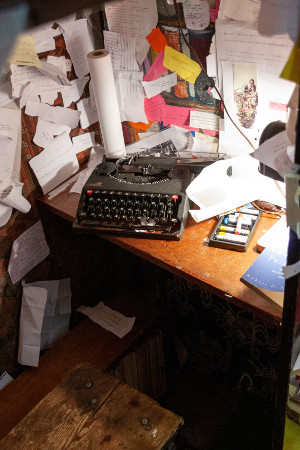- Details
- Hits: 1410
Artificial Intelligence is showing up in every corner of the writing world—from brainstorming tools to full-on story generators. If you’re a new fiction writer, you might be wondering: Is using AI to write stories cheating, or is it a helpful tool?
It’s a fair question—especially if you’re just starting out and haven’t built up much writing experience yet. While AI can offer major advantages, it can also create creative roadblocks and slow your growth as a writer if you're not careful.
Here’s a beginner-friendly breakdown of the pros and cons of using AI to write fiction, so you can make the right decision for your goals and growth.
Read more: Should You Use AI to Write Fiction? The Pros and Cons for New Writers
- Details
- Hits: 814
Writing a novel can be emotionally exhausting, especially when perfectionism, self-doubt, or burnout take over. For many writers, the constant urge to revise every sentence can make the process feel more like pressure than passion. The One Draft Method offers an alternative: a low-stress, judgment-free approach to getting your story out of your head and onto the page. In this article, we’ll break down what the One Draft Method is, its pros and cons, and how it can help protect your mental health while reigniting your creative flow.
What Is the One Draft Method?
The One Draft Method—also known as “writing in one go” or “one and done”—is a writing approach where authors aim to complete an entire fiction manuscript in a single, uninterrupted draft without stopping to edit, revise, or overthink. The core idea is to silence your inner critic and focus entirely on getting the story out from start to finish.
While it’s not for everyone, many authors swear by the method to increase productivity and reduce perfectionism. But is it right for you?
Let’s break down the pros and cons of using the One Draft Method for your novel.
Read more: The Pros and Cons of the One Draft Method for Writing a Fiction Book
- Details
- Hits: 951
Whether you're waiting at the doctor’s office, in the pickup line at school, commuting, or sneaking in a few quiet minutes at lunch, those little pockets of time can become powerful writing sessions—if you have the right tools.
For busy authors, finding ways to write on the go is essential to staying productive and keeping your stories alive. Thankfully, mobile writing apps make it possible to carry your creative workspace in your pocket. This guide explores the best writing apps for authors and writers who want to write anywhere, plus key features to look for and how to get the most out of your writing-on-the-go routine.
Why Mobile Writing Apps Are a Game-Changer for Authors
Let’s face it—life doesn’t always give us long, uninterrupted hours to write. But writing doesn’t have to happen in perfect conditions. With mobile writing tools, you can:
- Capture story ideas immediately before they vanish
- Work on your draft in small bursts, like 10 minutes in a waiting room
- Build a daily writing habit without needing a laptop or notebook
- Make consistent progress even with a packed schedule
Whether you're a novelist, blogger, or freelance writer, writing on the go can help keep your creativity flowing.
Read more: The Best Writing Apps for Authors on the Go: Stay Creative Anytime, Anywhere
- Details
- Hits: 792
So you’ve decided to start writing fiction—welcome to the wild, wonderful world of storytelling! Whether you're dreaming of novels, short stories, or just dipping your toes into creative writing, one of the best ways to begin is with prompts. They help take the pressure off and give your imagination a direction.
These seven beginner-friendly prompts are designed to ease you into writing while helping you build characters, settings, and conflict—without needing to plot out an entire book first. Let’s dive in!
📬 1. The Forgotten Letter
While cleaning out an old desk, your character finds a letter addressed to them—but it’s dated 20 years in the future.
What does it say? Who sent it? And what happens next?
This prompt is a great way to explore mystery, time, and character motivation.
Read more: 7 Creative Writing Prompts to Spark Your First Fiction Story
- Details
- Hits: 1679
If you're a beginning author wondering whether to publish under your real name or a pen name, you're not alone. Many writers wrestle with this decision, especially when taking their first steps into the world of publishing.
A pen name, also known as a pseudonym, is a fictitious name that an author uses instead of their legal name. While it may sound old-fashioned—think Mark Twain or George Eliot—pen names are still widely used today by writers in every genre. But why?
Let’s explore the types of people who choose a pen name and the reasons behind that choice, so you can make the best decision for your writing career.
Read more: Should You Use a Pen Name? What Types of Writers Choose One And Why









